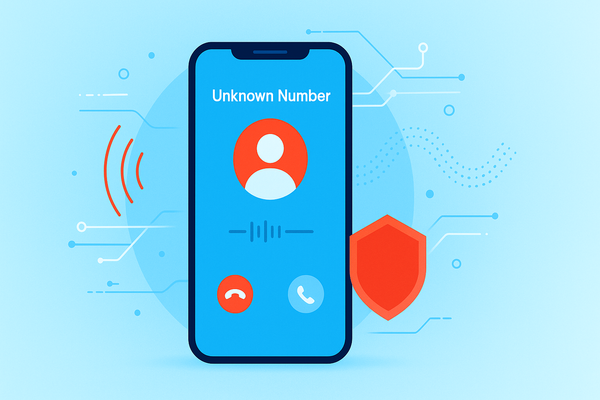Got a Silent Call From an Unknown Number? It’s Not Random, It’s a Scam

A wave of silent phone calls is targeting users worldwide. Learn how these scams work, why scammers stay quiet on the phone, and what you should do to protect your identity and data.
It usually starts with a call from an unknown number. You answer the call, but are met with silence. If you say anything, even just a simple “Hello?”, the call disconnects.
It feels strange, especially because it’s difficult to understand what it’s all about.
It’s likely that you’ve just interacted with the first stages of a silent phone scam — a tactic quietly spreading worldwide.
What’s Happening with These Silent Calls
Over the past year, people from all over the world have reported that they’re receiving calls where no one speaks. If you stay quiet, the caller stays quiet too. However, if you say something, the call ends abruptly.
Unfortunately, this behavior is indicative of a new tactic scammers use to determine if your phone number is active. When you answer, you confirm that it’s an active phone and your number can now be added to lists sold on the dark web or reused in voice-phishing (vishing), SMS scams, or AI voice-cloning attacks.
It’s also worth noting that not all calls might come from unknown or hidden numbers. The Caller ID feature should not be trusted, as criminals can easily abuse it. If the Caller ID says it’s a call from a bank or some other organization, it doesn’t mean it’s true.
Why Scammers Stay Silent
At first glance, a call with no words exchanged seems harmless. After all, you offered no sensitive information. But silence is strategic.
Here’s why scammers use this method:
- Number validation: Automated dialers test which numbers are answered and which are not. This is actual, valid information.
- Voice capture: Saying “Hello” confirms that a human answered, and in some scams, your voice could be recorded to create AI-based voice samples. In fact, copying voice, timber and intonation is much simpler than people realize. It takes mere seconds.
- Target building: Once validated, your number is marked as “live,” making it more valuable to criminals who sell contact lists.
- Future scams: Since you’ve been marked as active, you’ll likely receive follow-up calls in which cybercriminals pretend to be from your bank, your ISP, or even law enforcement.
A single “Hello” might not cause direct financial loss right away, but it can be the first step in a chain of fraud.
How to Protect Yourself
Stay one step ahead of scammers with a few simple measures:
- Don’t engage with silence. If you answer and there’s no sound, hang up immediately.
- Avoid saying “yes” or confirming your name. Some scams use recordings to fake consent for services.
- Block and report the number. Use your phone’s native spam blocking and reporting features.
- Never call back unknown numbers. They might redirect to premium-rate or spoofed services.
- Stay alert for follow-up scams. Once your number is determined as active, you can expect fake “bank security” or “delivery” calls. It could take months; don’t expect scammers to call the next day.
- Use a cybersecurity solution with scam call protection. Tools that identify suspicious behavior can stop threats before they escalate.
Bitdefender Can Help You Stay Safe
Bitdefender’s mobile protection tools automatically detect suspicious call patterns and phishing attempts before you’re exposed.
- Bitdefender Mobile Security blocks fraudulent links in SMS and apps.
- Anti-Phishing & Scam Alert warns you when a call or message looks unsafe.
- Bitdefender Mobile Security for Android includes a Call Blocking feature that allows you to automatically block unwanted calls from spam, scams, and hidden numbers.
FAQ: Silent Phone Scams Explained
Q1. Why does the caller hang up when I say “Hello” or anything else?
Because the scammer or auto-dialer only needs the victim to confirm that the number is active. Once you respond, the system records the call as “live.”
Q2. Can scammers use my voice to steal my identity?
In most cases, not directly. But AI-based voice cloning is on the rise, so it’s best not to speak or provide confirming phrases like “Yes.”
Q3. Are these calls dangerous even if I never answer?
No, ignoring or blocking them stops the scam before it starts.
Q4. How do I report or block a suspicious call?
You can block and report suspicious numbers via the phone’s integrated solution and by using the Call Blocking feature in Bitdefender Mobile Security for Android. Also, some telecom providers offer free tools to flag problematic phone numbers.
Q5. How can Bitdefender protect me from similar scams?
Bitdefender Mobile Security continuously analyzes global call patterns and phishing activity to block threats in real time, keeping your identity and personal data secure. Its Call Blocking features also provide an extra layer of security that deals directly with these types of threats.
tags
Author
Silviu is a seasoned writer who followed the technology world for almost two decades, covering topics ranging from software to hardware and everything in between.
View all postsYou might also like
Bookmarks
